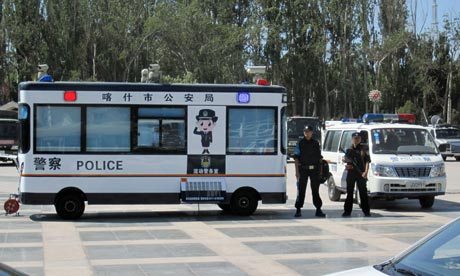
Chinese police have shot dead two suspects they were hunting in connection with a deadly attack in the troubled north-western region of Xinjiang, say officials.
Police have imposed a nighttime curfew in the centre of Kashgar and armed paramilitary police are guarding major junctions following the weekend's violence.
Officials have blamed extremists trained in camps in Pakistan for Sunday's attack, which left 11 dead. Pakistan, one of China's closest allies, has condemned the violence and pledged support in tackling terrorism.
A police officer said the incident appeared to be linked to violence the previous night – when two blasts and a knife attack left seven dead, including one assailant – but authorities have yet to say who was responsible for that assault.
A notice posted on the Xinjiang regional government website said police shot Memtieli Tiliwaldi, 29, and Turson Hasan, 34, who had been hiding in fields on the outskirts of Kashgar. Police had issued a reward of 100,000 yuan (£9,400) for information leading to their arrest, believing they were among a group who stormed a restaurant on Sunday, killing the owner and waiter and setting fire to the building. The assailants then hacked to death four people on the street and wounded 12 more. Police shot dead five suspects at the scene and arrested four others.
Authorities later said the group's leaders received firearms and explosives training at terrorist camps in Pakistan run by the separatist East Turkestan Islamic Movement (ETIM).
The region's Communist Party boss, Zhang Chunxian, has ordered a crackdown on "illegal religious activities" in the wake of the attacks, the state news agency Xinhua added.
It is less than a fortnight since officials said 18 people were killed in an attack on a police station in Hotan, another city in the region. Uighur exiles disputed that account.
Exiled Uighur leader Rebiyah Kadeer, president of the World Uyghur Congress, said she opposed violence but blamed the Chinese government for Sunday's attacks.
Kadeer said in a statement: "I am saddened that Han Chinese and Uyghurs have lost their lives. At the same time, I cannot blame the Uighurs who carry out such attacks for they have been pushed to despair by Chinese policies. I condemn the Chinese government for the incident.
"The Chinese government has created an environment of hopelessness that means it must take responsibility for civilian deaths and injuries caused by their discriminatory policies."
She added that the congress was sceptical of claims the attackers had connections to international terrorist groups.
The Uyghur American Association said in a statement that it feared Uighurs could face arbitrary detention and torture.
"Chinese officials have sown the seeds of instability in East Turkestan through the repressive measures they have enforced since the unrest of July 5, 2009", added president Alim Seytoff.
Xinjiang has been under tight security since the ethnic riots in the capital Urumqi, which killed almost 200 mostly Han Chinese people.
Professor Rohan Gunaratna of Singapore's International Centre for Violence and Terrorism Research said he believed the weekend's attacks were carried out by ETIM or people inspired by the group.
He added that ETIM – which he believes is the same organisation as the Turkestan Islamic Party – had been in decline since its leader was killed in 2003. Its size and influence was further reduced by the death of a new leader in a US missile strike in Waziristan last year.
Gunaratna said ETIM now numbered a few dozen members and relied on overseas terrorist groups for training because it did not have its own infrastructure.
While there is evidence of links between al-Qaida and ETIM, some experts question whether the contacts were substantial and how long they lasted. There are also disputes about whether ETIM is a group as such, or little more than an umbrella term.
Nicholas Bequelin, senior Asia researcher at Human Rights Watch, said: "The reason the Chinese government always points at foreign involvement in violent incidents in Xinjiang is to take the focus off local discontent."
Many in the large Uighur Muslim population are angered by religious and cultural controls, economic discrimination and large-scale Han migration.
No comments:
Post a Comment